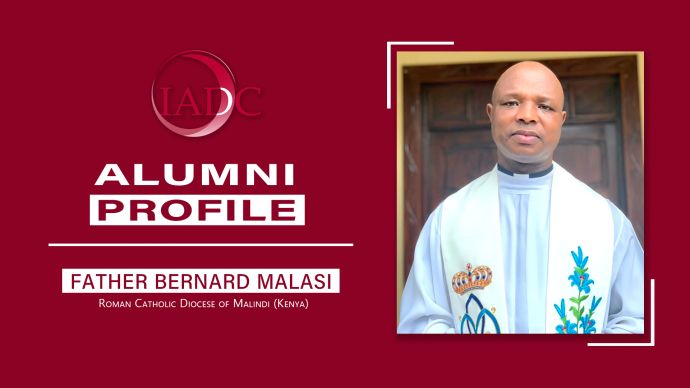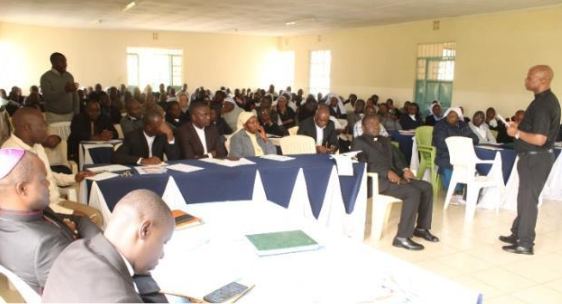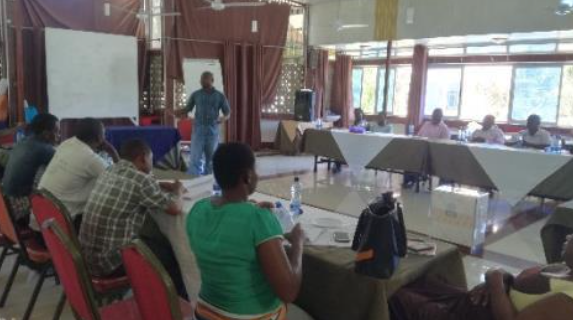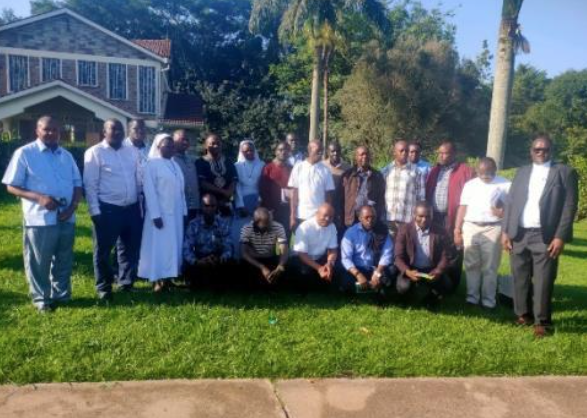
Alumnus Works with Kenyan State Authorities & Schools as Diocesan Safeguarding Coordinator
In little villages dotting Southern Kenya and its coastline, a pressing need for safeguarding and protecting the vulnerable demands immediate attention. Fr. Bernard Malasi has made it his life’s mission to respond to such dire needs. He found his calling for the priesthood through the influence of his devout parents, who shaped his Catholic upbringing. Throughout his vocational journey, he sought to maintain a balance between academic rigor and a reverent life. His education equipped him with the skills to navigate challenges, from combating patriarchy to safeguarding children against abuse and trafficking. Fr. Malasi harnessed these foundational experiences, directing them toward addressing the harrowing concerns surrounding the sexual abuse of children.
 Fr. Malasi went on to complete his Diploma and Licentiate in Safeguarding at the Institute of Anthropology (IADC) at Rome's Pontifical Gregorian University, which prepared him for the role he now holds as the Diocesan Safeguarding Coordinator in his home country. Following his education at the IADC, Fr. Malasi now dedicates his time to coordinating safeguarding training in the parishes, deaneries, and diocesan institutions, where he collaborates closely with other child protection stakeholders.
Fr. Malasi went on to complete his Diploma and Licentiate in Safeguarding at the Institute of Anthropology (IADC) at Rome's Pontifical Gregorian University, which prepared him for the role he now holds as the Diocesan Safeguarding Coordinator in his home country. Following his education at the IADC, Fr. Malasi now dedicates his time to coordinating safeguarding training in the parishes, deaneries, and diocesan institutions, where he collaborates closely with other child protection stakeholders.
Fr. Malasi stresses collaborative efforts between local authorities and the state’s child protection departments, working to educate leaders on state laws that protect the most vulnerable. He encourages spreading awareness of the multi-denominational nature that their communities hold, which allows him to use his spiritual platform to educate congregations on child protection issues. Currently, he is working on collaborating with the Cushite and the Bantus peoples, which are predominantly Muslim and Christian, thus expanding his cultural network.
 Fr. Malasi’s education at the IADC has played a transformative role in shaping his outlook on education, stating that his formation was planted firmly in the central mission of the Church in “respecting the dignity of every person and care for minors and vulnerable persons.” He underscores that the IADC’s safeguarding courses help to shape and sharpen the skills of professionals in both preventive and protective approaches in all safeguarding initiatives and programs.
Fr. Malasi’s education at the IADC has played a transformative role in shaping his outlook on education, stating that his formation was planted firmly in the central mission of the Church in “respecting the dignity of every person and care for minors and vulnerable persons.” He underscores that the IADC’s safeguarding courses help to shape and sharpen the skills of professionals in both preventive and protective approaches in all safeguarding initiatives and programs.
After witnessing how the patriarchal climate had often fostered an abusive environment for children, Fr. Malasi prioritized fixing this stigma and ensuring that justice is served. One of his most impactful experiences was addressing the lack of voice that children have in cases of sexual assault. While seeking justice was a complicated process, the diocese became the reference point for matters of child abuse. In one case, they discovered that seven young boys had been sexually abused by a trusted school employee. Offering resources for safeguarding and educating people on this matter opened up opportunities for children and victims of abuse to be heard. Acts of pastoral care and counseling were promptly implemented to support the victims and the diocese brought these cases to light for local authorities. That is why Fr. Malasi stands with the IADC – to preach knowledge that allows people to become culturally sensitive and aware, and to bring everyone to feel collectively responsible for safeguarding the society’s most vulnerable.
 Fr. Malasi wants to ensure that his efforts will lead to sustainable long-term measures that will carry on the profound legacy of the IADC. “Supporting the IADC is precisely enabling the formation of more experts in safeguarding work around the world,” says Fr. Malasi. His goals for safeguarding people in his country are to fund and support fully independent and equipped safeguarding offices in the Kenyan dioceses, allocating more funds specifically to policy change and training.
Fr. Malasi wants to ensure that his efforts will lead to sustainable long-term measures that will carry on the profound legacy of the IADC. “Supporting the IADC is precisely enabling the formation of more experts in safeguarding work around the world,” says Fr. Malasi. His goals for safeguarding people in his country are to fund and support fully independent and equipped safeguarding offices in the Kenyan dioceses, allocating more funds specifically to policy change and training.
Fr. Malasi’s journey serves as a testament to the intersection of personal conviction, faith, and academic pursuit, all which lead to a life devoted to serving and protecting all people, no matter how small or insignificant they might seem. His education at the IADC has been key in helping him to navigate and implement culturally sensitive safeguarding strategies, creating an uplifting ripple effect in his country.

